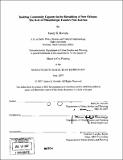| dc.contributor.advisor | Xavier de Souza Briggs. | en_US |
| dc.contributor.author | Bavishi, Jainey K. (Jainey Kumar) | en_US |
| dc.contributor.other | Massachusetts Institute of Technology. Dept. of Urban Studies and Planning. | en_US |
| dc.date.accessioned | 2008-01-10T16:03:18Z | |
| dc.date.available | 2008-01-10T16:03:18Z | |
| dc.date.copyright | 2007 | en_US |
| dc.date.issued | 2007 | en_US |
| dc.identifier.uri | http://hdl.handle.net/1721.1/39931 | |
| dc.description | Thesis (M.C.P.)--Massachusetts Institute of Technology, Dept. of Urban Studies and Planning, 2007. | en_US |
| dc.description | Includes bibliographical references (p. 61-63). | en_US |
| dc.description.abstract | How can funders strengthen community capacity in post-Katrina New Orleans? Residents of low-income, minority neighborhoods have historically faced government neglect, and consequently distrust decisionmakers, in a city of extreme race and class segregation. These communities are now being overlooked in a market-driven rebuilding process. Based on a tradition of self-determination, groups across the city are fighting to meet new needs. With massive institutional failure at all levels, philanthropy could support these groups. The purpose of this thesis is to help the Gulf Coast Funders for Equity, a consortium committed to more equitable redevelopment, think strategically about how to allocate resources to strengthen these groups, some of which form, struggle, and evaporate before funders can reach them. I use a mixed-method case study approach: in-depth interviews with key informants; review of media coverage and documentary sources; and a secondary review of comparable approaches. First, to sharpen the rationale for community capacity building, I examine the pre- and post-storm roles and contributions of informal groups in New Orleans. These groups serve as nodes of trust, support and enthusiasm in overlooked communities. | en_US |
| dc.description.abstract | (cont.) Second, I review lessons learned from foundation-sponsored capacity building initiatives in the wake of the 2004 Indian Ocean Tsunami and the civil unrest in Los Angeles in 1992. These cases highlight the importance of intermediary organizations to reach and support community groups, the variety of roles that a collaborative structure enables funders to play, and the importance of technical assistance for sustained community change. Third, having interviewed the grantor and prospective grantee (community group) insiders in this picture, I find a genuine interest in partnering on both sides. Among the community groups, I also find: significant information and capacity gaps; a desperate need for core operating support as much as program funds; a frustration that promising collaborations-in-progress are overlooked by funders; and concerns about the downsides of becoming grant-driven organizations. Among the funders, on the other hand, I find: confusion about what kinds of community groups to target; concerns about raising expectations through outreach without following through with funds; limited or missing capacity-including cultural competence-to do this kind of work; and variable willingness to take risks. | en_US |
| dc.description.abstract | (cont.) I recommend that funders: create local staff presence to do effective outreach and learn the landscape; provide appropriate technical assistance that does not compel groups to formalize; focus on brokering "bridging" relationships between community groups and local decisionmakers; emphasize sustained engagement; and develop the funder collaborative by choosing best options for joint action, defining roles and supporting continuous learning. | en_US |
| dc.description.statementofresponsibility | by Jainey K. Bavishi. | en_US |
| dc.format.extent | 63 p. | en_US |
| dc.language.iso | eng | en_US |
| dc.publisher | Massachusetts Institute of Technology | en_US |
| dc.rights | M.I.T. theses are protected by copyright. They may be viewed from this source for any purpose, but reproduction or distribution in any format is prohibited without written permission. See provided URL for inquiries about permission. | en_US |
| dc.rights.uri | http://dspace.mit.edu/handle/1721.1/7582 | |
| dc.subject | Urban Studies and Planning. | en_US |
| dc.title | Building community capacity in the rebuilding of New Orleans : the role of philanthropic funders post-Katrina | en_US |
| dc.type | Thesis | en_US |
| dc.description.degree | M.C.P. | en_US |
| dc.contributor.department | Massachusetts Institute of Technology. Department of Urban Studies and Planning | |
| dc.identifier.oclc | 182759792 | en_US |
